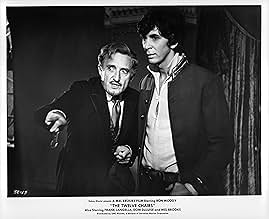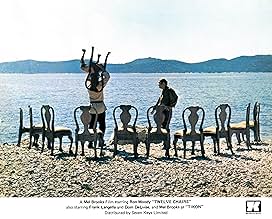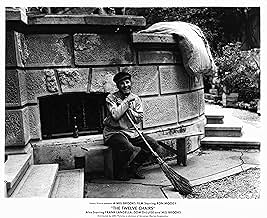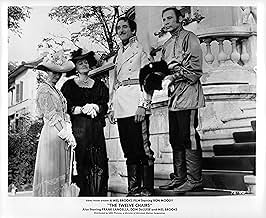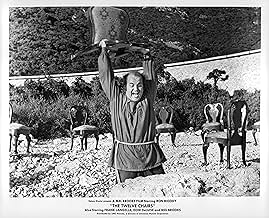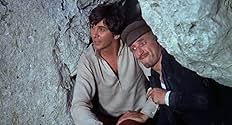IMDb RATING
6.4/10
7.4K
YOUR RATING
In 1920s Soviet Russia, a fallen aristocrat, a priest and a con artist search for a treasure of jewels hidden inside one of twelve dining chairs, lost during the revolution.In 1920s Soviet Russia, a fallen aristocrat, a priest and a con artist search for a treasure of jewels hidden inside one of twelve dining chairs, lost during the revolution.In 1920s Soviet Russia, a fallen aristocrat, a priest and a con artist search for a treasure of jewels hidden inside one of twelve dining chairs, lost during the revolution.
- Awards
- 1 win & 1 nomination total
Andréas Voutsinas
- Nikolai Sestrin
- (as Andreas Voutsinas)
Mladen 'Mladja' Veselinovic
- Peasant
- (as Mladja Veselinovic)
Petar Banicevic
- Sergeant
- (uncredited)
Dejan Cavic
- Orator
- (uncredited)
Featured reviews
It is the forgotten Brooks movie. Probably because it has the most controlled script story, and had the least wild, satyric inventiveness of any of his films.
After he wrote and directed the original THE PRODUCERS, Brooks did not do another film for a few years. The second one was this one set in the post-Russian Revolution period in the Soviet Union. Ron Moody (Fagin in the musical OLIVER) is a minor Tsarist nobleman who discovers, when attending his mother-in-law on her death bed, that she hid her fortune in jewelry in one of the dining room chairs. There were a set of twelve chairs, and they were appropriated by the government to be given to deserving members of the proletariat. Moody discovers that his mother-in-law did confess this to one person besides him: the local Russian Orthodox Priest (Dom DeLuise). Moody finds the latter a difficult opponent to beat to the fortune first. By chance he falls in with a young swindler (Frank Langella) and he and Langella pursue the chairs, and also send DeLuise on a wild goose chase following a second set of similar chairs.
What we get is a view of the Soviet Union in 1928, as the Civil Wars died out and the regime consolidated power. Trotsky's name is now dismissed (as a street shows). The stage is dominated by the state oriented drama that is anti-capitalist. Witness the performance of Andreas Voutsinas - the original "Carmen Ghia" in the first PRODUCERS, as the government backed manager of the theater group that Moody and Langella join. There is a life and death threat behind comments he gives to one of the stage crew he controls. We also see how the common people try to cope with the changes - being sent across country on government sponsored jobs - to houses that the government may furnish.
Brooks has his first role in his own films in this one - as Tikhon, the drunken, ex-servant of Moody. He receives a slap from the latter, and considers it exactly like a hug.
Like IT'S A MAD, MAD, MAD, MAD WORLD, THE TWELVE CHAIRS looks at the antics people will go through for hidden wealth. Langella, who is a street criminal anyway, is the only sane member of the three treasure seekers. He is a realist (the first really serious one in Brooks' films), and has adapted to the new conditions fairly easily by living on his considerably keen wits. He realizes that he is hampered as well as helped by his alliance with Moody, but manages to figure out how to live with Moody as best as possible. Moody has become a bureaucrat to survive in the new regime (he's suspect as an aristocrat), but he still has his pretenses. It takes the events he shares with Langella for him to finally give up his pretenses. Together both men find out what is really worthwhile about living. DeLuise is less lucky. He just discovers the perils of being a loner.
After he wrote and directed the original THE PRODUCERS, Brooks did not do another film for a few years. The second one was this one set in the post-Russian Revolution period in the Soviet Union. Ron Moody (Fagin in the musical OLIVER) is a minor Tsarist nobleman who discovers, when attending his mother-in-law on her death bed, that she hid her fortune in jewelry in one of the dining room chairs. There were a set of twelve chairs, and they were appropriated by the government to be given to deserving members of the proletariat. Moody discovers that his mother-in-law did confess this to one person besides him: the local Russian Orthodox Priest (Dom DeLuise). Moody finds the latter a difficult opponent to beat to the fortune first. By chance he falls in with a young swindler (Frank Langella) and he and Langella pursue the chairs, and also send DeLuise on a wild goose chase following a second set of similar chairs.
What we get is a view of the Soviet Union in 1928, as the Civil Wars died out and the regime consolidated power. Trotsky's name is now dismissed (as a street shows). The stage is dominated by the state oriented drama that is anti-capitalist. Witness the performance of Andreas Voutsinas - the original "Carmen Ghia" in the first PRODUCERS, as the government backed manager of the theater group that Moody and Langella join. There is a life and death threat behind comments he gives to one of the stage crew he controls. We also see how the common people try to cope with the changes - being sent across country on government sponsored jobs - to houses that the government may furnish.
Brooks has his first role in his own films in this one - as Tikhon, the drunken, ex-servant of Moody. He receives a slap from the latter, and considers it exactly like a hug.
Like IT'S A MAD, MAD, MAD, MAD WORLD, THE TWELVE CHAIRS looks at the antics people will go through for hidden wealth. Langella, who is a street criminal anyway, is the only sane member of the three treasure seekers. He is a realist (the first really serious one in Brooks' films), and has adapted to the new conditions fairly easily by living on his considerably keen wits. He realizes that he is hampered as well as helped by his alliance with Moody, but manages to figure out how to live with Moody as best as possible. Moody has become a bureaucrat to survive in the new regime (he's suspect as an aristocrat), but he still has his pretenses. It takes the events he shares with Langella for him to finally give up his pretenses. Together both men find out what is really worthwhile about living. DeLuise is less lucky. He just discovers the perils of being a loner.
"Hope for the best, expect the worst", as the title song goes, is exactly how I felt when I picked up my copy. Having read the original Russian novel and being a fan of Mel Brooks, I was curious how the two would come together. I was rather apprehensive, knowing how Russian literature usually suffers in translation, but hopeful that Brooks would somehow make something of it anyway. The film disappoints on both counts - there's precious little of the original in it, and Brooks isn't at his best here either. Moody is actually OK as Vorobyaninov, but the casting of Langella as Bender is just plain wrong, as he cannot possibly convey the depth and subtlety of the original character. Langella alone is enough to kill this film for anyone familiar with the book. None of the uproarious humor of the novel is anywhere to be found, while the few semi-funny visual gags are merely typical Brooks slapstick and have nothing to do with the source material. And even those aren't among Brooks' best. However, having expected the worst, I wasn't exactly disappointed. An OK little comedy, if you don't expect too much. If you want more, read the book.
As Mel Brooks films go, I rate it second only to Young Frankenstein. The action takes place in Russia 10 years after the Revolution. Ron Moody is marvelous as a low IQ and totally inept former nobleman, now hiding out as a clerk in a government office, who learns that the family jewels had been sewn into one of the 12 dining room chairs. He returns to his former residence, now an old folks home, and learns from former servant, now janitor, Mel Brooks that the chairs are gone, confiscated by the government. Con man Frank Langella threatens to turn Moody in if he does not allow him in on the quest. Of course, the chairs have been widely distributed. A major fly in the ointment is Dom Deluise, the village priest, who has also learned the secret. He relinquishes all for greed ("O, Thou who knowest all---you know.") and competes in the search. Not a perfect movie, but loaded with laughs. May be Dom's funniest role. I give it an 8 out of 10.
THE TWELVE CHAIRS is a different kind of Mel Brooks comedy. Its story, from a Russian novel by Ilf and Petrov, will seem very tasteful and human to those who are acquainted with Brooks' usual raunchiness. This movie is a nice change. Ron Moody and Frank Langella star, with Dom DeLuise and a special appearance by Mel Brooks as Tikon.
A "serious comedy" from Mel Brooks. "The Twelve Chairs" borders on farce but is relatively restrained. This restraint is all the more remarkable in light of Dom DeLuise's manic attempts to take over. Ron Moody (who is best remember as Fagin in 'Oliver' on film and on the West End and Broadway)is superb. Frank Langella is less impressive, but he does bring the necessary character to the role. If you expect and want "Blazing Saddles" this movie is not for you. Nor is it as perfect a picture as "Young Frankenstein". But this Brooksian take on a Russian comedy of errors is well worth your attention. The belly laughs are few and far between, but the tugs on the heartstrings (along with some slapstick) suffice. If I am spare on the details, it is only because I have not seen this motion picture since its theatrical release in 1970; it's definitely one to which I have to renew my acquaintance.
Did you know
- TriviaMel Brooks had problems with Yugoslavian extras who didn't speak English. In one scene, extras playing museum guards were supposed to walk through a museum, ringing hand bells and shouting, "Closing time! Closing time!" Instead, the extras misunderstood and shouted, "Cloakie Bye! Cloakie Bye!" Brooks decided "Cloakie Bye" was funnier, so he left it in the movie.
- GoofsDuring the chase through the train yard, a modern era bus can be seen passing in the background.
- Quotes
Ostap Bender: [after yet another failure] Remember the famous Russian proverb: "The hungrier you get, the tastier the meal." On the other hand, the French have a proverb: merde!
- Crazy creditsIn the opening credits the title of the movie is showed in Russian first (even with a typographic error 'Dvenadzat' stchlyev'), then it changes into the english title. The same happened at the end of the credits with the words "The end" (Konez), first cames the Russian word, than the english translation.
- ConnectionsFeatured in Sneak Previews: Take 2: Who's Funnier: Mel Brooks or Woody Allen? (1980)
- SoundtracksHope for the Best, Expect the Worst
Music by Johannes Brahms ("Hungarian Dance No. 4 in F# minor") and lyrics by Mel Brooks
- How long is The Twelve Chairs?Powered by Alexa
Details
Box office
- Gross US & Canada
- $1,806,258
Contribute to this page
Suggest an edit or add missing content

Top Gap
By what name was Le mystère des douze chaises (1970) officially released in India in English?
Answer

